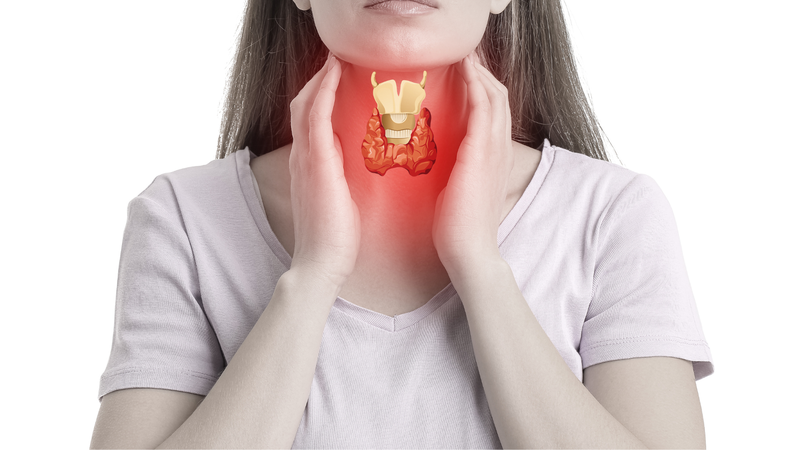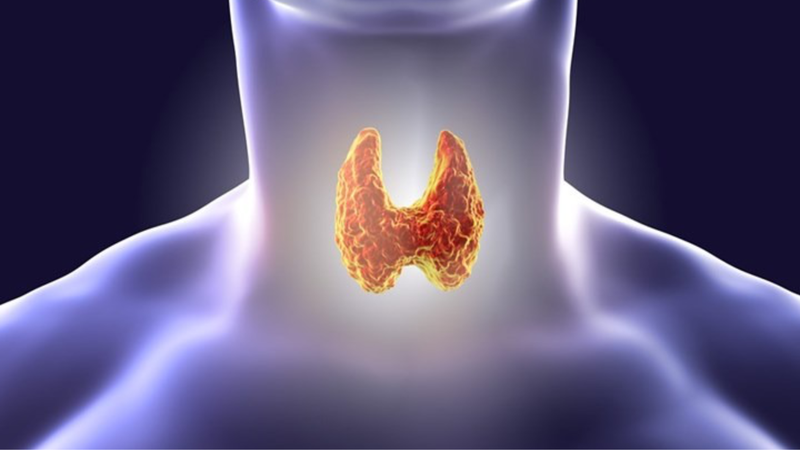Thyroid disease is increasingly common, especially in women with a rate of disease 5-8 times higher than in men. According to statistics, in the United States, there are about 20 million people with thyroid-related diseases, of which 13 million have not been diagnosed. So, what is thyroid disease? What are the causes and signs of thyroid disease? Let’s find out in this article.
What is thyroid disease?
What is thyroid disease? Thyroid disease is a general term for disorders related to hormones produced by the thyroid gland. This hormone plays an important role in regulating many biological functions of the body.
The two most common cases are:
- Hypothyroidism: When the thyroid gland produces too little hormone, the body’s metabolic rate is reduced, leading to a series of symptoms such as fatigue, weight gain, dry skin, constipation, etc.
- Hyperthyroidism: On the contrary, when the thyroid gland produces too much hormone, the metabolic rate increases abnormally, causing symptoms such as weight loss, rapid heartbeat, anxiety, or hand tremors, etc.
Thyroid disease can affect anyone, but some groups of people are at higher risk, including:
- Women: The rate of thyroid disease in women is 5-8 times higher than in men.
- People with a family history: If someone in your family has thyroid disease, you are at higher risk than normal people.
- People with autoimmune diseases: Some autoimmune diseases such as pernicious anemia, type 1 diabetes, primary adrenal insufficiency, rheumatoid arthritis, Turner syndrome can increase the risk of thyroid disease.
- People using iodine medications: Taking medications that contain a lot of iodine (such as amiodarone) can affect thyroid function.
- Older people: The risk of thyroid disease increases in people over 60, especially women.
- People who have been treated for thyroid disease or cancer: People with a history of treatment for thyroid disease or cancer are at risk of having a recurrence or developing complications related to the thyroid.

What is thyroid disease? This is a question of many people
What causes thyroid disease?
So the above section has helped you understand what thyroid disease is. Here are the causes of thyroid disease:
Causes of hypothyroidism
Hypothyroidism occurs when the thyroid gland produces little or no hormones needed by the body. Some of the main causes of hypothyroidism include:
- Thyroiditis: Inflammation can affect the normal thyroid gland or goiter, causing hormone production to be disrupted.
- Hashimoto’s thyroiditis: This is a common autoimmune disease, in which the immune system attacks the thyroid tissue itself, causing the thyroid to not function normally. The disease is hereditary and is common in women.
- Postpartum thyroiditis: This condition occurs in about 5 – 9% of women after giving birth.
- Iodine deficiency: Iodine is an essential element for the production of thyroid hormones. Therefore, iodine deficiency is the main cause of hypothyroidism worldwide.
- Congenital hypothyroidism: Babies can be born with congenital hypothyroidism due to abnormalities in the development of the thyroid gland. If left untreated, the condition can affect the child’s physical and mental health.
- Pituitary disorders: Although rare, pituitary disorders can affect the regulation of thyroid hormone production.
- Treatment side effects: Treatment of hyperthyroidism with radioactive iodine or side effects of radiation therapy for cancer can lead to hypothyroidism.
- Thyroidectomy: Surgery to remove part or all of the thyroid gland can also cause hypothyroidism.

Hypothyroidism occurs when the thyroid gland reduces hormone production.
Causes of hyperthyroidism
Hyperthyroidism is a condition in which the thyroid gland produces too much hormone, leading to metabolic disorders in the body. Some of the main causes of hyperthyroidism include:
- Graves’ disease: This is the most common form of hyperthyroidism, caused by the immune system attacking the thyroid tissue itself, stimulating the gland to produce too much hormone. Graves’ disease, if not treated promptly, can lead to many dangerous complications.
- Thyroid tumor: A benign tumor that develops in the thyroid gland, can produce thyroid hormone on its own, leading to hyperthyroidism.
- Thyroiditis: Inflammation can affect the normal thyroid gland or goiter, causing hormone production to be disrupted.
- Excess iodine: When the body takes in too much iodine, the thyroid gland will stimulate the production of more hormones than necessary, leading to hyperthyroidism.
- Non-cancerous pituitary tumor: A benign tumor that develops in the pituitary gland can affect the regulation of thyroid hormone production, leading to hyperthyroidism.
Signs of thyroid disease
The thyroid plays an important role in regulating the body’s metabolic rate. When the thyroid gland is not functioning properly, human health will be significantly affected. Therefore, early detection of thyroid disease signs is extremely necessary for timely treatment, avoiding dangerous complications.
Warning signs of thyroid disease:
- Weight changes: People with hypothyroidism may gain weight abnormally, while people with hyperthyroidism may lose weight despite eating well.
- Sensitivity to temperature: Fatigue, sweating a lot, or feeling colder than usual.
- Sleep disorders: Difficulty falling asleep, poor sleep, waking up in the middle of the night.
- Mood changes: Depression, anxiety, irritability, irritability.
- Neck or throat problems: Goiter, swollen neck, sore throat, difficulty swallowing, hoarseness.
- Skin and hair changes: Dry skin, rash, brittle hair, brittle nails.
- Digestive disorders: Persistent constipation (hypothyroidism) or diarrhea, loose stools (hyperthyroidism).
- Menstrual and reproductive effects: Menstrual disorders, increased risk of miscarriage, infertility.
- Eyes: Red, swollen, blurred or watery eyes, sensitive to light.
- Quality of life: Memory loss, decreased ability to concentrate, decreased sexual desire.
- Muscles, bones, joints: Muscle pain, bone pain or carpal tunnel syndrome.

Digestive disorders are one of the signs of thyroid disease.
Dangerous complications of thyroid disease
Thyroid dysfunction can lead to many serious health complications. Here are some complications that can occur in hypothyroidism and hyperthyroidism:
Complications of hypothyroidism
Some common complications of hypothyroidism are:
- Gland enlargement (goiter): The thyroid gland increases in size to try to produce enough hormones.
- Cardiovascular problems: Slow heart rate, high blood pressure, heart failure.
- Reduced kidney function: Affects the body’s ability to filter waste.
- Nerve damage: Causes tingling, numbness, pain in the arms, legs or other affected areas.
- Birth defects: Increased risk in pregnant women with untreated hypothyroidism.
- Miscarriage or premature birth.
- Mental health problems: Depression, anxiety, memory loss.
- Myxedema coma: The most dangerous complication of hypothyroidism, which can lead to death.
Complications of hyperthyroidism
Some common complications of hyperthyroidism are:
- Eye problems: Bulging eyes, dry eyes, blurred vision, even loss of vision.
- Cardiovascular disorders: Rapid heart rate, heart failure, atrial fibrillation.
- Osteoporosis: Increased risk of fractures.
- Dermatitis: Red, swollen skin, occurring in the legs and feet.
- Thyrotoxicosis: A dangerous condition caused by too high levels of thyroid hormones in the blood.
Prevention of thyroid diseases
Thyroid diseases are increasingly common, affecting the health and quality of life of many people. Therefore, prevention and maintenance of a healthy lifestyle play an extremely important role:
- Regular health check-ups: Regular health check-ups help detect early signs of thyroid abnormalities, thereby providing timely treatment.
- Overall health care: Maintain a reasonable lifestyle, get enough sleep, and limit stress.
- Avoid exposure to radiation: Radiation can increase the risk of thyroid cancer.
- Provide enough iodine: Iodine is an essential element for the production of thyroid hormones. Foods rich in iodine include seaweed, kelp, seafood (should be used in moderation in patients with hyperthyroidism).
- Supplement fruits and green vegetables: Some green vegetables such as Malabar spinach, fish mint, water spinach can help improve symptoms of muscle pain, fatigue, irregular heartbeat.
- Choose foods rich in omega-3 fatty acids: Omega-3 fatty acids found in salmon, beef, shrimp, etc. help support thyroid function.
- Use low-fat yogurt: Low-fat yogurt provides iodine and vitamin D necessary for the thyroid.
- Supplement nuts: Almonds, cashews, etc. are sources of magnesium, vegetable protein, vitamin B, vitamin E and other minerals that help support effective thyroid function.
- Increase selenium: Selenium found in beef, chicken, fish, oysters, cheese, etc. helps protect the thyroid gland from the harmful effects of free radicals.

Regular health check-ups to detect early signs of thyroid disease
Hopefully the information in the above article has helped you understand what thyroid disease is, some of the signs of recognition as well as the dangerous complications of this disease. Regular health check-ups and a healthy, scientific diet will help protect you from this disease.





